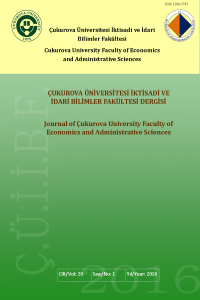An Investigation of Relation Between the Economic Development and Confidence in the Major Institutions
Öz
This paper compares citizens’ confidence in some major public and civil institutions within their countries. An
erosion or loss of confidence in the major institutions of the society is very serious threat to democracy. The
continuity of institutions and political systems depends on the citizens’ confidence which may be a better indicator
of public disaffection because they are the central pillars of society within the modern world and strongly related to
societal trust. The confidence in institutions is the most important element to establish an interconnection between
the citizenship and their own states, a part of a cohesive society in where citizens have confidence in national-level
institutions and having a critically important emphasis in terms of institutionalization and consolidation of
democracy.
In this context, the aim of this study is the comparison of the countries taking into account the perception of
confidence in court, government, political parties, parliament, university, labor unions, press, armed forces and
police. In this study, the confidence in public and civil institutions is measured based on the perceptions of citizens,
using the data, obtained from VI. Wave of world-values survey over the period 2010-2013.
Anahtar Kelimeler
Economic development Confidence in Institutions Regression analysis
Kaynakça
- Acemoglu, D. and Robinson, J. A. (2012), Why nations fail: Origins of power, properity and poverty, Great Britain, Profile Books Ltd.
- Alexander, A. Inglehart, R. & Welzel, C. (2011). “Measuring effective democracy: A defense”, World Values Research WVR, Volume 4 , Number 1, 1-39.
- Democracy index (2014), Democracy in retreat, A report from the Economist Intelligence Unit.
- Georgarakos, D. and Fürth,S. (2014). “Household repayment behavior: The role of social capital and institutional, political, and religious beliefs”. European Journal of Political Economy. In Press, http://dx.doi.org/10.1016/j.ejpoleco.2014.10.001
- Gonda, M. G. (2014).”Role of educational institutions in shaping the future of business and society”, Procedia Economics and Finance, 11, 635 – 641
- Kekic, Laza (2007), The Economist Intelligence Unit’s index of democracy, The World in 2007, 1-11.
- Lühiste, K. (2006). Explaining trust in political institutions: Some illustrations from the Baltic states. Communist and Post-Communist Studies. 39, 475-496.
- Sapsford R., Abbott, P. (2006). “Trust, confidence and social environment in postcommunist societies”, Communist and Post Comminist Studies, 39, 59-71.
- MacLeod,W.B. (2013). “On Economics: A review of why nations fail by D. Acemoglu and J. Robinson and pillars of prosperity by T. Besley and T. Persson”, Journal of Economic Literature, 51:1, 116–143.
- Nawaz, S. (2015). “Growth effects of institutions: A disaggregated analysis”. Economic Modelling, 45, 118–126.
- Shlapentokh, V. (2006). “Trust in public institutions in Russia: The lowest in the world”. Communist and Post-Communist Studies, 39, 153-174.
- Veise, Nima(2010). “Reconciling Acemoglu and Sachs: Geography, institutions and technology” Journal of International Affairs, Fall/Winter, Vol. 64, No. 1, 205- 220.
- Welzel, C. and Alexander A. C. (2008), “Measuring effective democracy: The human empowerment approach”. WVR 1(1):1-34.
Öz
Kaynakça
- Acemoglu, D. and Robinson, J. A. (2012), Why nations fail: Origins of power, properity and poverty, Great Britain, Profile Books Ltd.
- Alexander, A. Inglehart, R. & Welzel, C. (2011). “Measuring effective democracy: A defense”, World Values Research WVR, Volume 4 , Number 1, 1-39.
- Democracy index (2014), Democracy in retreat, A report from the Economist Intelligence Unit.
- Georgarakos, D. and Fürth,S. (2014). “Household repayment behavior: The role of social capital and institutional, political, and religious beliefs”. European Journal of Political Economy. In Press, http://dx.doi.org/10.1016/j.ejpoleco.2014.10.001
- Gonda, M. G. (2014).”Role of educational institutions in shaping the future of business and society”, Procedia Economics and Finance, 11, 635 – 641
- Kekic, Laza (2007), The Economist Intelligence Unit’s index of democracy, The World in 2007, 1-11.
- Lühiste, K. (2006). Explaining trust in political institutions: Some illustrations from the Baltic states. Communist and Post-Communist Studies. 39, 475-496.
- Sapsford R., Abbott, P. (2006). “Trust, confidence and social environment in postcommunist societies”, Communist and Post Comminist Studies, 39, 59-71.
- MacLeod,W.B. (2013). “On Economics: A review of why nations fail by D. Acemoglu and J. Robinson and pillars of prosperity by T. Besley and T. Persson”, Journal of Economic Literature, 51:1, 116–143.
- Nawaz, S. (2015). “Growth effects of institutions: A disaggregated analysis”. Economic Modelling, 45, 118–126.
- Shlapentokh, V. (2006). “Trust in public institutions in Russia: The lowest in the world”. Communist and Post-Communist Studies, 39, 153-174.
- Veise, Nima(2010). “Reconciling Acemoglu and Sachs: Geography, institutions and technology” Journal of International Affairs, Fall/Winter, Vol. 64, No. 1, 205- 220.
- Welzel, C. and Alexander A. C. (2008), “Measuring effective democracy: The human empowerment approach”. WVR 1(1):1-34.
Ayrıntılar
| Birincil Dil | Türkçe |
|---|---|
| Bölüm | Araştırma Makaleleri |
| Yazarlar | |
| Yayımlanma Tarihi | 30 Haziran 2016 |
| Gönderilme Tarihi | 1 Haziran 2016 |
| Yayımlandığı Sayı | Yıl 2016 Cilt: 20 Sayı: 1 |


